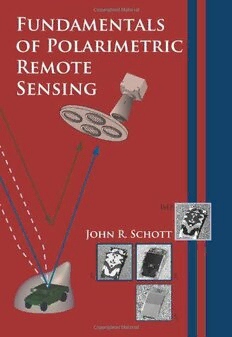Download Fundamentals of Polarimetric Remote Sensing PDF Free - Full Version
Download Fundamentals of Polarimetric Remote Sensing by John R. Schott in PDF format completely FREE. No registration required, no payment needed. Get instant access to this valuable resource on PDFdrive.to!
About Fundamentals of Polarimetric Remote Sensing
Polarimetric remote sensing offers the potential to provide a new dimension for observations of the Earth. This book takes a systems approach to the physical processes involved with formation, collection, and analysis of polarimetric remote sensing data in the visible through longwave infrared. The emphasis is on Earth observation at human scales (ground sample distances of fractions of a meter to tens of meters) where the contrast between manmade objects and natural backgrounds are typical subjects of interest. This text is targeted at individuals with a sound quantitative understanding of remote sensing who need an introduction to polarimetric signals as they relate to remote sensing. It includes a brief review of the polarized nature of electromagnetic energy and radiometry and introduces ways to characterize a beam of polarized energy (Stokes vectors) and polarized energy matter interactions (Mueller matrices). The polarized bidirectional reflectance distribution function (pBRDF) is introduced as a way to characterize the reflective and emissive polarimetric behavior of materials. The goal is to provide the reader with an introduction to the topic, an appreciation of the issues, and the tools to begin to work in this field. Contents: - Review of Radiometry - Wave Nature of EM Energy and Introduction of the Polarization Ellipse - Ways to Represent the Polarimetric State of a Beam- Polarimetric Interactions: Reflection and Transmission- Polarimetric Bidirectional Reflectance Distribution Functions (BRDF) - Polarized Form of the Governing Equation Including Atmospheric Scattering Terms - Sensors for Measuring the Polarized State of a Beam - Processing and Display Algorithms - Measurements and Modeling of the pBRDF of Materials - Longwave Infrared pBRDF Principles - LWIR pBRDF Measurements and Modeling
Detailed Information
| Author: | John R. Schott |
|---|---|
| Publication Year: | 2009 |
| ISBN: | 9780819475343 |
| Pages: | 263 |
| Language: | English |
| File Size: | 12.333 |
| Format: | |
| Price: | FREE |
Safe & Secure Download - No registration required
Why Choose PDFdrive for Your Free Fundamentals of Polarimetric Remote Sensing Download?
- 100% Free: No hidden fees or subscriptions required for one book every day.
- No Registration: Immediate access is available without creating accounts for one book every day.
- Safe and Secure: Clean downloads without malware or viruses
- Multiple Formats: PDF, MOBI, Mpub,... optimized for all devices
- Educational Resource: Supporting knowledge sharing and learning
Frequently Asked Questions
Is it really free to download Fundamentals of Polarimetric Remote Sensing PDF?
Yes, on https://PDFdrive.to you can download Fundamentals of Polarimetric Remote Sensing by John R. Schott completely free. We don't require any payment, subscription, or registration to access this PDF file. For 3 books every day.
How can I read Fundamentals of Polarimetric Remote Sensing on my mobile device?
After downloading Fundamentals of Polarimetric Remote Sensing PDF, you can open it with any PDF reader app on your phone or tablet. We recommend using Adobe Acrobat Reader, Apple Books, or Google Play Books for the best reading experience.
Is this the full version of Fundamentals of Polarimetric Remote Sensing?
Yes, this is the complete PDF version of Fundamentals of Polarimetric Remote Sensing by John R. Schott. You will be able to read the entire content as in the printed version without missing any pages.
Is it legal to download Fundamentals of Polarimetric Remote Sensing PDF for free?
https://PDFdrive.to provides links to free educational resources available online. We do not store any files on our servers. Please be aware of copyright laws in your country before downloading.
The materials shared are intended for research, educational, and personal use in accordance with fair use principles.

